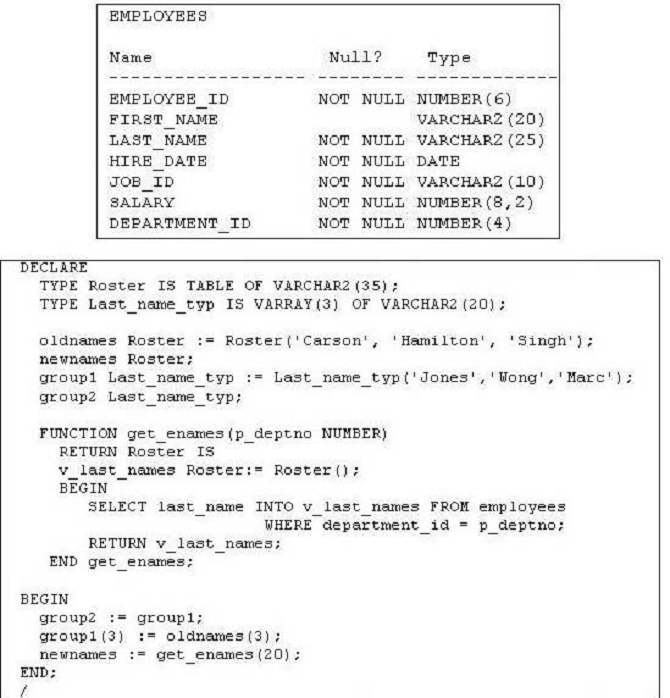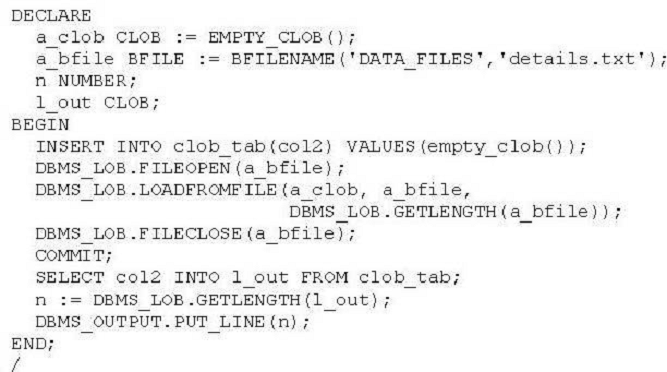Oracle 1z0-146 Exam Practice Questions (P. 4)
- Full Access (117 questions)
- Six months of Premium Access
- Access to one million comments
- Seamless ChatGPT Integration
- Ability to download PDF files
- Anki Flashcard files for revision
- No Captcha & No AdSense
- Advanced Exam Configuration
Question #16
Identify the two type of PL/SQL programs for which you consider setting the compilation method to native mode. (choose two.)
- APL/SQL programs that are still in the debugging phase of development
- BPL/SQL programs that have computation-intesive procedural operations
- CA PL/SQL program, which is called with the same parameters by multiple sessions
- DPL/SQL programs that spend most of their execution time in executing SQL statements
Correct Answer:
BC
BC
send
light_mode
delete
Question #17
See the Exhibit:

The PL/SQL block fails to execute;
What could be the reason?

The PL/SQL block fails to execute;
What could be the reason?
- ANested tables cannot be returned by a function
- BThe NEWNAMES nested table has not been initialized
- CThe assignment operator cannot be used to transfer all the element values from GROUP1 to GROUP2
- DThe third element of OLDNAMES cannot be assigned to the thrid element of GROUP1 because they are of incosistent data types
- ELAST_NAME values cannot be assigned to the V_LAST_NAMES nested table because local collection types are not allowed in SQL statements
Correct Answer:
E
E
send
light_mode
delete
Question #18
See the Exhibit:

DATA_FILES is a directory object that contains the DETAILS.txt text file. You have the required permissions to access the directory object. You have a table using the following command:
CREATE TABLE clob_tab(col2,CLOB);
Examine the PL/SQL statement in exhibit that you execute for loading the external text file into the table that currently has no rows. The PL/SQL block results in an error. What correction must be done to ensure the PL/SQL block executes successfully?

DATA_FILES is a directory object that contains the DETAILS.txt text file. You have the required permissions to access the directory object. You have a table using the following command:
CREATE TABLE clob_tab(col2,CLOB);
Examine the PL/SQL statement in exhibit that you execute for loading the external text file into the table that currently has no rows. The PL/SQL block results in an error. What correction must be done to ensure the PL/SQL block executes successfully?
- AThe L_OUT variable must be initialized to an empty locator
- BThe L_OUT variable has to be declared as a temporary LOB
- CThe A_CLOB variable has to be declared as a temporary LOB
- DThe clause RETURINING col2 INTO a a_clob should be added to the INSERT statement to correctly initialize the locator
Correct Answer:
D
D
send
light_mode
delete
Question #19
Which two types of query result cannot be stored in the query result cache? (Choose two.)
- ASubquery results
- BResults of a query having the SYSDATE function
- CResults of a query having the GROUP BY clause
- DResults of a query having the DATE data type in the WHERE clause
Correct Answer:
AB
AB
send
light_mode
delete
Question #20

What is the outcome?
- AThe table is created successfully
- BIt generates an error because DEFAULT cannot be set to EMPTY_BLOB() during table creation
- CIt generates an error because DEFAULT cannot be set to null for a CLOB column during table creation
- DIt generates an error because DEFAULT cannot be set to null for a BFILE column during table creation
Correct Answer:
A
A
send
light_mode
delete
All Pages
